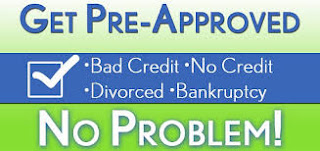Bad credit car finance
Bad credit car finance
The inexperience of youth, poor financial advice, unexpected loss of employment, or any number of other factors can leave good person in need of a bad-credit car loan. A poor credit history report isn't always reflective of your character or work ethic. However, it does affect the way a bank or lender sees you.
Poor credit doesn't mean you can't buy a car, and doesn't automatically mean you can't get a car loan with terms that don't break your monthly budget.
Like everything else, "bad" is a matter of opinion and degree. If the score is borderline, some lenders might still see a good prospect while others, with slightly different criteria, would see more risk.
Check Auto Loan Rates
Most important: Shop around. While the average interest rate for borrowers with good credit is between 4% and 5%, subprime borrowers will pay an average of 10% to 13%, depending on their credit score. Some lenders can go higher than that, according to Phil Reed, senior consumer advice editor for Edmunds.com. "You don't want to have the attitude of 'just get me a loan.' There are still deals to be made."
Don't take someone else's word that your credit is bad. Check for yourself by obtaining your credit report and credit score. Even 2 candidates with an identical score might not be the same in the eyes of a lender, says John Van Alst, staff attorney for the National Consumer Law Center. "Even if your score is tarnished, you may have a better chance than someone with the same score and no (credit) history," he says.
Keep in mind: Because car loans involve less money over a shorter period of time -- and an auto is easier to repossess than a home -- the same credit score that might have put you in a subprime mortgage loan could bring you a prime or near-prime auto loan. If you actually have good credit and apply for a subprime loan, it's likely that you will get less favorable terms than you deserve.
Some lenders will see your tarnished history in a more positive light than others. "That's where it becomes more important to shop around," says Reed. But be careful if a lender or lot caters specifically to subprime consumers, he says. "Seeing places that are appealing specifically to subprime is a little bit of a warning flag."
"Even if you don't think you can get a loan, go to your bank, go to your credit union first," says Van Alst. Apply at the bank where you have a checking account or your credit union. And see if your employer or insurance company offers auto financing.
Check out sources known for car loans, rather than lenders known for catering to low-credit clients. This can include name-brand national banks, local and regional banks, and well-known online lenders.
Ask a friend or relative to go with you, says Massachusetts-based consumer attorney Yvonne Rosmarin. Not only does it help to have another set of eyes and ears, but you can give your partner a role to play -- such as acting unimpressed, dubious or critical of the loan terms.
Look for the cheapest money -- the lowest annual percentage rate over the shortest period. Don't be sidetracked by promises of a lower monthly payment over a longer period of time, says Van Alst. If the only way you can make the payments is to take out a long-term loan, you probably can't afford the vehicle.
Nonprime buyers are more likely to encounter lending contracts stuffed with nonessential goods and services, says Josh Frank, director of advanced analytics in the entertainment and hospitality industry and a onetime senior researcher for the Center for Responsible Lending in Durham, North Carolina. Never allow the loan to be contingent on purchasing any add-on, such as extended warranties, after-market services and even insurance, says Frank.
If you finance through a dealer, make sure the terms are final, not contingent or conditional, before you sign and drive away. All too often buyers are told days or weeks later that their monthly payments or the required down payment has been increased. Or they're told the financing is not complete and they must accept a higher interest rate. It's sometimes known as a "yo-yo scam." According to the Center for Responsible Lending, victims of yo-yo scams pay an average of 5 percentage points higher in interest than someone who is not a victim.











No comments: